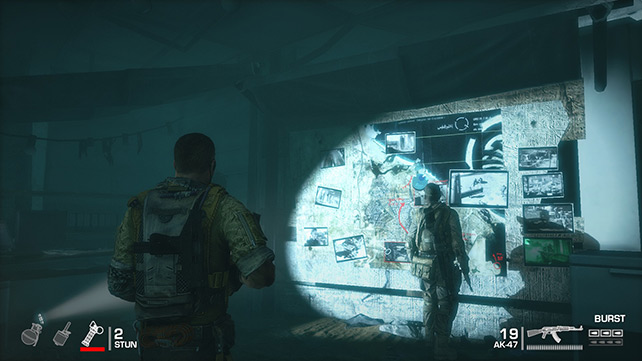
Spec Ops: The Line supposedly approached military action with grace and nuance, questioning our role as trigger-pullers. It starts out strong in that respect. But by the end, only one thing is clear: what we witness during our several hours of play isn’t what really happened.
Unreliable narration added a layer of intrigue to Bioshock, Dragon Age 2 and a huge number of films. But the storytelling technique only works when you respect your audience. Folks need to be able to keep up or they can feel like they wasted their time.
Bioshock’s events never changed, just how you saw them; the twist ending merely echoed your own actions. Dragon Age 2’s narrator corrected himself whenever he veered off from the true events. You knew exactly which of your actions mattered to the story. Yet in Spec Ops: The Line, the conclusion revises the player’s actions from the entire game, invalidating almost everything they’ve done.
Rule 1: The Audience Is a Valid Witness.
When on the field, we play the role of Walker’s director. He does what we tell him. We see behind Walker as we direct. So the events we witness should be reliable (as it is our own perspective). But as we’re given the concluding reveal, we’re told that Walker re-interpreted the events (that we saw, heard, and experienced) how he wanted. It was his delusion.

If Walker’s experience derived from the first-person perspective, we would be with him, forced to accept anything we see through his eyes. It would make the squad-tactics and storytelling less cinematic. The narrative invalidation could work, given a proper structure like that. Of course, to make this work requires a costly trade-off for narrative purposes, and possibly cheating the player’s experience. The only other option forces an ending that continues the original trajectory presented by the first few missions of the game instead of introducing the oft-used “twist”. Of course, changing this at any point other than initial planning would prove too costly for the project at large. I must believe that the original script is at fault, then!
An ending changes your perception of how things happened, but it shouldn’t change what actually happened. Wouldn’t you rather learn that you misunderstood the events you saw, then learn you never heard the real story? In Spec Ops, we believe the game shows us a compelling story about one man slowly coming apart in a terrible situation. What we learn is that the process was very much already under way. Everything in the main game turns into some kind of reinterpretation. Of what exactly? Not sure. What we saw didn’t happen, far as I know.
It’s neat to discover that what our player actions operated under false pretenses, or that you were manipulated. But to discover your actions weren’t true at all? It’s enough to make me want to shove the unreliable narrator’s nose in the steaming pile and yell, “No!”
There’s a fundamental problem with the way Spec Ops uses this literary device. The foundation of an unreliable narrative holds together with two other rules. One is the “…Only I didn’t say fudge” principle: the narrator clearly tells you where you’re being misled. This allows us to fill in the blank with our imagination without getting completely lost.

Rule 2: The “Who Are You Talking To?” Principle.
On the other hand, if the tale desires an unreliable narrator, it must actually question said narrator unless you seek to hoodwink your audience without any foreshadowing (i.e., bad literature)! When a protagonist talks to somebody who isn’t there, the supporting cast must question this behavior. Since Lugo and Adams follow Walker everywhere, their feedback transforms into the baseline for truth. Without cluing the player into any discrepancy, we are forced to believe that the whole testimony is valid. As the Bible says in Matthew 18:16, “Every matter may be established by the testimony of two or three witnesses.”
When you’re playing a squad-based game with “three witnesses,” this validates the experiences as trustworthy. To pull the carpet right out from under that? It’s a problem.
I wanted Spec Ops The Line to demonstrate a showcase for game narrative and meaningful discussion about the woes of war, as well as shooter games violence at large. But it disrespects its audience with an ending that tells them nothing they did or saw meant anything. As a disciple of Jesus, there’s nothing worse than feeling like you squandered what God gave you. Spec Ops’ conclusion makes sure you feel terrible for the wrong reason: using time God gave you to play a game where your actions and the story are self-invalidating.
